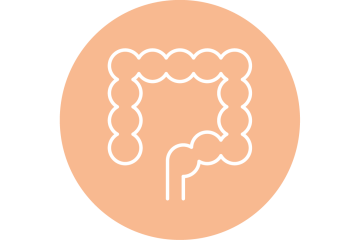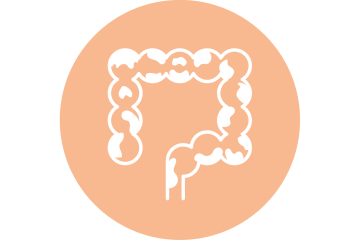After you turn 50, you can choose between a colonoscopy every 10 years or FOB test every 1 year.
Colonoscopy is an examination of your large intestine with a flexible device. The device also enables doctors to perform a medical procedure to remove polyps – growths on the intestine's inner lining. Then, these findings are sent for a histological examination under a microscope. The essential part of a problem-free colonoscopy exam is proper prep.
What will happen during the exam?
After thorough prep, you will go to a gastro clinic. The nurses will explain the procedure. It's common to get sedated before because it helps overcome unpleasant sensations during the examination. First, the doctor will examine your rectum using his finger and then use an endoscope to look deeper. They will examine your colon (the small intestine is commonly unreachable), and if they find any anomalies, they will collect a sample of the tissue for further analysis. It's crucial to go through all prep steps at home before you go to the clinic – if you don't, the examination might be insufficient.
What do you need for the examination?
- Referral from your GP
- List of medications you take
- Accompaniment (in a case of sedation)
- Careful prep
How to do the prep properly? Read one week before the examination!
The doctor’s inspection depends on the level of colon cleansing. Colonoscopy prep takes place at home and consists of a diet, laxatives, and drinking plenty of fluids.
The prep was good if:
The colon is cleansed
The examination can be completed
The doctor sees everything they need to…
…Can remove abnormal growths immediately
…Can save your life

The prep was insufficient if:
Your colon is not properly cleansed
The exam is postponed or repeated
The doctor can easily miss potential findings…
…Can’t see all the structures and reach the end of the colon
…Can’t prevent abnormal growths progression
How to do the cleanse?
- Macrogol (Fortrans, VistaPrep) is a standard cleansing agent. These are gentle, but the disadvantage might be the large volume (4 litres) and salty taste.
- CitraFleet, Clensia, Eziclen, MoviPrep, PicoPrep and Penvu are agents in smaller volumes and have pleasant flavours. Still, they have limitations for people of higher age, pregnant women and patients with kidney and liver diseases or heart failure.
Your GP will prescribe a cleansing agent, even if your visit is preventive. The prep and taking of the laxatives are meant to be finished 4 hours before the examination to ensure an adequately cleansed colon. It’s convenient to split the prep into 2 phases – the first dose in the evening, the day before the exam, and the second one in the morning, the day of the exam. If your colonoscopy appointment is in the afternoon, it’s possible to take both doses that day. Your GP will advise you.
One drinks the dissolved agent one litre an hour, and it’s important to drink the whole thing! Beware! Don’t forget to drink clear liquids as well. The agents cause diarrhoea. Gentle cleansing of the anus with wet wipes or water might reduce the irritation.
If your cleanse was unsuccessful, let the nurse or the doctor know before the examination. It’s best to postpone or repeat it later.
What else not to forget – adjust your diet, medications and regime
7 days before
Discontinue the use of iron medications (Fe++). Contact your GP if you take antiplatelet drugs or have diabetes.
3 days before
Don’t eat foods that leave waste, seeds or skins behind – whole grain pastry with poppy seeds or cinnamon, vegetables and fruits with skins or seeds, including grapes, kiwi, strawberries, gooseberries, melon, tomatoes, peppers and many more. Don’t avoid physical activity before the exam.
1 day before
It’s best not to eat solid foods one day before the examination. You can have a cup of tea for breakfast and clear meat broth for lunch. Don’t drink coffee or tea with milk or cream, consume dairy products, fruit juice with pulp and sparkling or alcoholic beverages. During the day, drink plenty of water or clear fluids along the laxatives, as they remove water from the system. Drink only water, tea or still beverages in the evening.
The day of
Come on an empty stomach, and don’t smoke. Continue the use of your regular medications (e.g. ACE inhibitors). Don’t forget to bring the list of your medications with you.
What happens after the examination?
In the case of sedation, you can’t drive after the procedure and can go back to work 12 hours after it. It’s necessary to be accompanied by someone who’ll pick you up and take you home. The doctor will observe you in a recovery room until the sedation effects subside. Then, you’ll get a medical report concerning the examination for your GP, and you can go home with your company. You can eat regular food for the rest of the day. Still, drink plenty of fluids. The doctor who performed the procedure might suggest other recommendations.
Will it hurt?
No. You can choose to use a soothing agent, however you cannot drive a car afterwards and you need to have someone to accompany you.
Do I need to pay for the exam?
What is the waiting time for such an examination?
5 - 6 weeks.
Where to go?
The list of gastro clinics is at www.kolorektum.cz.
Do I need to call for the test results?
Follow your doctor’s instructions.
What can I get from the exam?
You’ll know everything is okay with your colon.
What more can I do?
Eat healthy, limit red meat consumption and add vegetables and fruit to your diet.
What more can I do?
Eat healthy, limit read meat and add vegetables and fruit to your diet.

